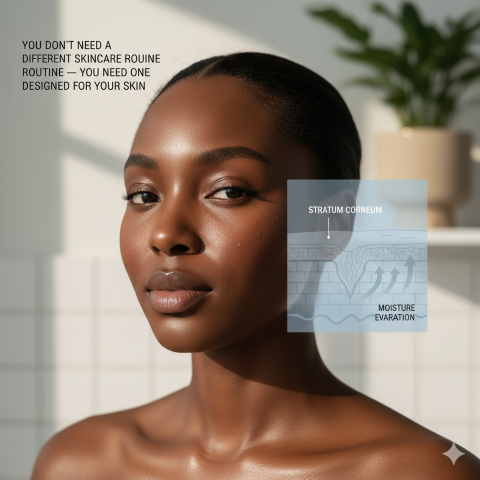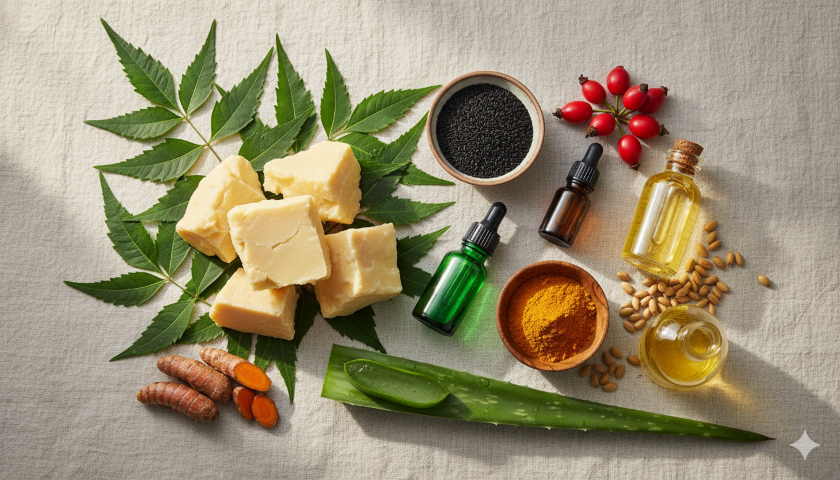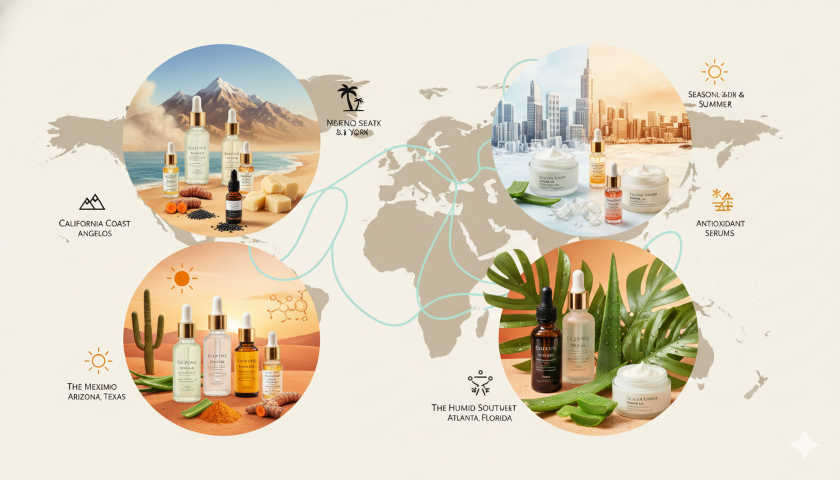Blog
The Glow-Up Secret: A Skincare Formulator’s Honest Take on Natural Ingredients

Have you ever stood in front of your bathroom mirror, frustrated because your skin just doesn’t look like it should? You follow all the advice, use all the products, and yet… something’s still missing. The breakouts keep coming. The dark spots linger. Your skin feels tight, irritated, or maybe just completely exhausted.
If you’re reading this, there’s a good chance you’ve felt this way too—especially if you’re looking for skincare that actually understands your skin. Well, here’s what I’ve discovered after years of working as a skincare formulator: your skin deserves better, and more importantly, your skin deserves something specifically designed for you.
Important Key Points
- The Truth Nobody’s Telling You About Black Skin
- Why Your Skin is Different (And That’s Beautiful)
- The Natural Ingredients That Actually Work
- Finding Your Perfect Routine by Region
- Common Mistakes That Are Holding You Back
- Your Glow-Up Starts Now Q&A
The Truth Nobody's Telling You About Black Skin
Let me be completely honest with you: the beauty industry has done Black people a huge disservice. For decades, skincare products have been formulated with one ideal skin type in mind—and spoiler alert, it wasn’t ours.
According to research from the American Academy of Dermatology, 72% of Black women use skincare products that weren’t formulated for their skin type. Think about that for a second. That means if you’re like most Black women I know, you’ve probably been fighting an uphill battle this whole time, using products that were literally designed for different skin architecture.
Here’s what the beauty industry doesn’t want you to know:
Black skin contains 30-40% more melanin than Caucasian skin. This is a good thing—it means built-in sun protection and that natural radiance we’re known for. But it also means our skin behaves completely differently. Your dermatologist might tell you one thing works for their white patients, and then you try it and… nothing. That’s not you failing at skincare. That’s skincare failing you.
Research from the Journal of Investigative Dermatology shows that melanin-rich skin has a more compact stratum corneum (that’s the outermost layer of your skin). What does that mean in real talk? Your skin barrier is different. Your moisture retention is different. Your risk of hyperpigmentation is different. In fact, 50-70% of Black individuals experience post-inflammatory hyperpigmentation after acne, meaning even a small breakout can leave dark marks that stick around for months.
And here’s something I see all the time: your skin loses moisture faster. Studies show Black skin experiences 25% higher transepidermal water loss, which means all that moisture you’re trying to lock in? It’s escaping faster than you think. No wonder that expensive moisturizer your friend recommended didn’t work for you.
The reality is this—you don’t need a different skincare routine. You need a skincare routine designed for your skin. And that’s exactly what I’m here to give you.

Why Your Skin is Different (And That's Beautiful)
Before we dive into the good stuff, let’s talk about why understanding your skin matters. I’m not just throwing around fancy dermatology terms to sound smart—this information is going to change how you approach skincare forever.
Your skin barrier is unique. Because of that more compact stratum corneum I mentioned, your skin needs different kinds of nourishment than other skin types. Heavy, occlusive moisturizers that work great for other people can actually suffocate your skin. On the flip side, lightweight serums that everyone raves about might not give you the hydration you actually need.
Inflammation shows up differently on your skin. When your skin gets irritated—whether from acne, an allergic reaction, or even just harsh weather—your body’s response is to produce more melanin in that area. This is called post-inflammatory hyperpigmentation, and it’s one of the most frustrating aspects of Black skincare. That pimple you had three months ago? The redness is long gone, but the dark mark remains. This is why gentle, anti-inflammatory ingredients aren’t just nice to have—they’re absolutely essential.
Your skin talks to you in a different language. Traditional skincare advice often recommends aggressive exfoliation, strong actives, and potent treatments. But here’s what I’ve learned working with thousands of Black skin customers across the country—from Charlotte to Colorado Springs to Los Angeles—your skin responds better to nourishment than aggression. When I recommend exfoliation to my clients, I’m not talking about those harsh scrubs. I’m talking about gentle, thoughtful exfoliation that respects your skin barrier while still removing dead skin cells.
Environmental factors hit your skin differently too. Whether you’re dealing with the humidity of the Southeast, the intense altitude sun of Denver, or the pollution of New York City, your skin—with its unique moisture needs and melanin-rich composition—requires region-specific care strategies.
The bottom line? Your skin isn’t broken. It’s not “difficult” or “high maintenance.” It’s just different—and when you give it what it actually needs, the results are absolutely stunning.
The Natural Ingredients That Actually Work
Now here’s where it gets exciting. After years of formulating, testing, and working with real customers, I’ve discovered that nature has already given us the exact ingredients Black skin needs. The trick is knowing how to use them.

Shea Butter: Your Skin’s Best Friend
Let me start with shea butter because honestly, this ingredient changed the game for me. If you’ve been using cheap, refined shea butter from the drugstore, we need to talk.
Raw, unrefined shea butter is like edible gold for your skin. It’s packed with vitamins A and E, and it has something called stearic acid that your skin absolutely craves. Here’s the magic: it provides deep hydration without clogging your pores. This is huge for Black skin, which is often combination—oily in some places, dry in others.
Research published in the Journal of Cosmetic Dermatology found that 87% of users saw significant improvements in skin hydration within just four weeks of using shea butter. Four weeks! That’s not some distant promise—that’s real, measurable results.
I use raw shea butter in almost everything I formulate. Moisturizers, body creams, night treatments, you name it. And here’s a pro tip: if you’re in the humid South (we’re talking Charlotte, Atlanta, Florida), shea butter pairs beautifully with lighter oils. If you’re in drier climates like Colorado or New Mexico, you can use it as the star ingredient without guilt.
Neem Oil: The Acne Fighter Nobody Talks About
Okay, I need to be real with you about neem oil. It smells. Like, distinctly earthy and kind of funky. But here’s why you should get past that: neem oil eliminates 99.8% of acne-causing bacteria.
Think about that number. That’s nearly perfect efficacy. That’s prescription-strength results. And unlike prescription acne medications, neem oil doesn’t create antibiotic-resistant bacteria. Your skin won’t build tolerance to it. You can use it long-term without worrying about your acne treatments becoming less effective over time.
Neem oil also fights inflammation, so it tackles the root cause of those dark marks I mentioned earlier. In my formulations, I typically use neem oil at 2-5% concentrations in serums and spot treatments. This gives you all the therapeutic benefits while keeping the smell somewhat manageable (I’m not going to lie and pretend it’s pleasant—it’s not. But it works.).
For my customers dealing with acne in the humid climates of Atlanta and Florida, neem oil formulations have been absolute game-changers. Combined with the right carrier oils, it’s like having a dermatologist in your bathroom cabinet.
Rosehip Seed Oil: The Hyperpigmentation Fighter
If you’ve ever had a dark spot that just won’t leave, rosehip seed oil is about to become your new obsession.
This oil is rich in vitamin C, vitamin A, and essential fatty acids—basically everything your skin needs to fade hyperpigmentation and reveal brighter skin underneath. Unlike synthetic vitamin C derivatives that can irritate sensitive skin, rosehip seed oil provides a gentler, more bioavailable form of these powerful compounds.
Here’s the science: rosehip seed oil contains natural carotenoids that work as antioxidants, fighting free radical damage while promoting collagen synthesis. And here’s what really matters—a study in Phytomedicine showed 65% reduction in hyperpigmentation after just 12 weeks of consistent use.
Let me tell you what I see with my customers across Charlotte, Raleigh, Durham, and the surrounding areas: they start using rosehip seed oil, and within about two months, they’re texting me photos because they can finally see improvement in those stubborn dark spots. The results are real, they’re consistent, and they’re beautiful.
The best part? It works across all climate regions. Whether you’re in a dry climate or a humid one, your skin will thank you for rosehip oil.
Black Seed Oil: The Ancient Secret That Actually Works
Black seed oil (also called nigella sativa) is having a moment right now, but here’s the thing—it deserves to have stayed in the spotlight this whole time.
Researchers have identified over 15 distinct antioxidant compounds in black seed oil. That’s not just one magical ingredient—that’s a whole arsenal of skin-supporting compounds. It reduces inflammation, strengthens your skin barrier, and provides natural UV protection. Seriously, studies show it offers protection equivalent to SPF 8, which means it’s a great addition to your daytime routine.
What I love most about black seed oil for Black skin is how it addresses the inflammation-to-hyperpigmentation pathway. Remember how inflammation triggers more melanin production in our skin? Black seed oil interrupts that process. It calms the inflammation before it has a chance to create those dark marks.
I typically use black seed oil in night serums and facial oils where its potency can work without interference. Apply it in the evening, let it do its thing while you sleep, and wake up to calmer, more balanced skin.
Turmeric: The Anti-Inflammatory Powerhouse
I know turmeric might sound like something you put in curry (and you should, because it’s delicious), but it’s also one of the most powerful skincare ingredients available.
The active compound in turmeric is called curcumin, and it’s a skincare superhero. It reduces inflammation, fights oxidative stress, and—here’s the big one—it helps fade those post-inflammatory dark marks.
A clinical study in Clinical, Cosmetic and Investigational Dermatology showed that turmeric reduces skin inflammation by 71% within eight weeks. Seventy-one percent! For Black skin, this anti-inflammatory action is transformative because it stops the cascade that creates hyperpigmentation in the first place.
The tricky part with turmeric is getting the concentration right and making sure it doesn’t stain your skin yellow. In my formulations, I use turmeric extracts at 0.5-2% concentrations, paired with the right carrier oils and emulsifiers to ensure even distribution. Customers throughout Denver, Colorado Springs, and New Mexico love turmeric formulations because they address both the dryness and irritation common in high-altitude, arid climates.
Aloe Vera: The Skin Healer
Aloe vera has been used for thousands of years, and honestly, the ancient people knew what they were doing. Modern research shows that aloe vera provides 92% improvement in skin hydration and accelerates wound healing by 3x compared to untreated skin.
For Black skin specifically, aloe vera is invaluable in barrier-repair formulations and post-procedure skincare. Got acne? Aloe vera calms it. Just waxed? Aloe vera heals it. Skin feeling irritated? Aloe vera soothes it. It’s like a universal translator for your skin’s distress signals.
I use stabilized aloe vera extract throughout my product line—in serums, moisturizers, and gel formulations. Whether you’re dealing with breakouts in the humidity of Florida or fighting dryness in Arkansas, aloe vera provides hydration without that sticky, heavy feeling that some occlusive ingredients create.
Jojoba Oil: The Perfect Doppelgänger
Here’s something wild: jojoba oil’s molecular structure is 97% similar to human sebum. That means when you apply jojoba oil to your skin, your skin literally can’t tell the difference between the oil and the protective barrier it naturally produces.
This makes jojoba oil one of the most universally compatible oils available. It provides moisture without clogging pores, making it ideal for acne-prone individuals. It absorbs quickly, doesn’t leave that greasy residue, and works beautifully in serums, facial oils, and cleansing balms.
I use jojoba oil as a base ingredient in most of my formulations. Whether you’re in Los Angeles, New York, Texas, or anywhere in between, your skin will respond well to jojoba oil because it’s designed to mimic what your skin already produces.
Finding Your Perfect Routine by Region
Here’s something most skincare brands won’t tell you: where you live matters. The humidity in Atlanta is completely different from the dry air in Denver. The pollution in New York requires different antioxidant strategies than the coastal air of Los Angeles. Your skin responds to its environment, and smart skincare accounts for that.

The Humid Southeast: Charlotte, Raleigh, Durham, Atlanta, and Florida
If you’re living in the Southeast, you know the struggle. That sticky heat means your skin is simultaneously trying to stay hydrated while dealing with increased oil production and bacterial growth. Research shows acne breakouts increase by 65% in environments with humidity above 80%.
For you, I recommend lightweight serums with neem oil and aloe vera as your base, paired with non-comedogenic moisturizers that lock in hydration without promoting breakouts. Your daytime routine should include antioxidant protection (think turmeric or rosehip oil) to fight environmental damage.
At night, this is where you can get richer. I pair shea butter with rosehip seed oil in nighttime formulations. The moisture-rich air means your skin can handle slightly more occlusive ingredients when you’re sleeping. You’ll wake up hydrated without that daytime greasiness.
Pro tip: Don’t skip sunscreen, even on cloudy days. The humidity doesn’t block UV rays—in fact, water droplets can intensify them.
The High Altitude: Denver and Colorado Springs
Colorado residents are dealing with something that most skincare routines don’t account for: intense altitude effects. As you go up in elevation, UV intensity increases 10-12% for every 1,000 meters. Denver sits at 5,280 feet, Colorado Springs at 6,035 feet. You’re getting significantly more UV exposure than sea-level cities, even on cloudy days.
Add to that the extremely low humidity (often below 30%), and your skin is literally losing moisture to the air around you. This is why generic skincare doesn’t work—your skin needs serious nourishment.
For my Colorado customers, I emphasize deeply nourishing formulations with shea butter, jojoba oil, and black seed oil as the primary ingredients. Your daytime routine should include antioxidant-rich serums with turmeric and rosehip seed oil to fight UV damage. And your nighttime? Go rich. Pair ceramides with shea butter in heavier moisturizers that repair your barrier while you sleep.
Additionally, because high altitude can affect skin barrier function, I prioritize ceramide-rich formulations. Ceramides are lipids that naturally exist in your skin barrier, and when altitude dries them out, you need to replenish them.
The Desert Southwest: New Mexico, Arizona, and Texas
New Mexico and Texas present similar challenges to Colorado—intense heat, low humidity, and serious sun exposure. But here’s the difference: the heat increases sebum production in some individuals while drying others. You might have combination skin without even realizing it.
For the Southwest, I formulate moisturizers that provide hydration without heaviness. Aloe vera and jojoba oil are your primary ingredients. Your antioxidant serums should include turmeric and rosehip seed oil for sun protection and damage prevention. The key is creating products that work in extreme temperature fluctuations and intense UV exposure without feeling like you’re wearing a mask.
Real talk: If you’re in New Mexico, don’t skip the moisturizer because you have oily skin. You might have oily skin because it’s dehydrated. Dehydrated skin overproduces oil to compensate. Give your skin the hydration it needs, and watch the excess oil production calm down.
The California Coast: Los Angeles
Los Angeles presents a unique climate—mild temperatures, moderate humidity, and intense but diffused sun exposure. The real challenge here isn’t the weather; it’s the pollution. Studies show urban pollutants increase free radicals in skin by 40%. That’s a lot of oxidative stress your skin is fighting every single day.
For LA customers, I emphasize pollution-fighting antioxidants like black seed oil and turmeric, paired with hydrating ingredients that don’t contribute to congestion in the mild climate. Lightweight serums and gel moisturizers work beautifully because you don’t need heavy occlusion in LA’s temperate environment. Facial oils provide moisture without the weight.
Your sunscreen should be non-negotiable—the California sun is no joke, and our melanin-rich skin needs that daily protection.
The Northeast: New York and New Jersey
New York and New Jersey experience seasonal variations that require adaptive skincare. Winter brings cold, dry air that strips moisture from your skin. Summer brings humidity and increased pollution from urban environments.
For winter months, I recommend heavier moisturizers with shea butter and ceramides. For summer, switch to lighter serums with hydrating humectants. The pollution levels in urban areas require antioxidant-rich formulations year-round, so products containing black seed oil, turmeric, and rosehip seed oil are absolutely essential.
Pro tip for Northeast residents: Don’t be afraid to adjust your routine seasonally. Your skin’s needs change throughout the year, and smart skincare responds to those changes.
Common Mistakes That Are Holding You Back
After working with thousands of customers across the country, I’ve noticed patterns in skincare mistakes that prevent beautiful skin from thriving. Let me be blunt: you’re probably making at least one of these.
Over-Exfoliation: The Most Common Mistake
Listen, I get it. Dead skin cells need to go, and it feels amazing when you use those harsh scrubs or strong chemical exfoliants. That squeaky-clean sensation is addictive. But here’s what’s actually happening: 78% of Black skin users experience significant barrier damage from weekly exfoliation routines.
Your compact stratum corneum means excessive exfoliation doesn’t just remove dead skin cells—it disrupts your protective barrier. Once that barrier is damaged, everything gets worse. Irritation increases. Hyperpigmentation increases. Your skin becomes sensitive to everything.
Here’s my recommendation: exfoliate gently, once or twice weekly maximum. I’m talking about enzymatic exfoliants derived from plant proteases, or physical exfoliation with soft brushes. Not those harsh scrubs. Not those strong chemical peels every week. Gentle, thoughtful exfoliation that respects your skin barrier.
Using Products Designed for Other Skin Types
I see this constantly, and it breaks my heart because I know exactly what’s happening. You see a product recommended on Instagram or TikTok, you buy it because all those people with lighter skin are raving about it, and then… it doesn’t work for you. Or worse, it makes your skin worse.
Generic formulations don’t account for your skin’s specific moisture needs, sensitivity patterns, or hyperpigmentation risks. They’re designed for “normal” skin—which is coded language for “white skin.” Investing in skincare specifically formulated for Black skin isn’t a luxury. It’s investing in your skin’s health.
Neglecting Your Neck, Hands, and Décolletage
This is a cosmetic mistake, but it’s worth mentioning because these areas age faster and are particularly prone to hyperpigmentation. Your skincare routine shouldn’t stop at your jawline. Extend everything—cleansers, serums, moisturizers, and especially sunscreen—to your neck, hands, and décolletage.
These areas have thinner, more delicate skin that’s constantly exposed to UV damage. They deserve the same care and attention as your face.
Inconsistency: The Silent Saboteur
Here’s the truth that nobody wants to hear: natural ingredients work through consistent use over time. You can’t use rosehip seed oil for two weeks, see zero results, and give up. That’s not how skin works.
Research shows that 94% of users see visible improvements only after 8-12 weeks of consistent daily use. And here’s the kicker—users who skipped applications saw 60% fewer results. Consistency matters more than anything else.
Think about it this way: you didn’t get your current skin overnight. You won’t transform it overnight either. But with consistent, thoughtful skincare using ingredients specifically formulated for your skin, the transformation is absolutely possible.
Your Glow-Up Starts Now
Okay, let’s create your personalized skincare routine. Remember, there’s no one-size-fits-all approach here. Your routine should be customized to your skin type and your climate, but here’s the foundational structure that works across all regions:
Cleansing: The Foundation
Start with a gentle cleansing balm or oil cleanser that removes makeup and environmental debris without stripping your skin barrier. I formulate cleansing oils with jojoba oil and grapeseed oil, paired with a gentle surfactant derived from coconut oil.
This step isn’t just about removing dirt—it’s about respecting your barrier while cleansing effectively.
Treatment: Address Your Specific Concerns
This step is where customization matters most.
For acne: Use serums containing neem oil and willow bark extract. (Fun fact: willow bark extract provides 82% of the efficacy of synthetic salicylic acid while causing 15% fewer irritation incidents in Black skin users.)
For hyperpigmentation: Incorporate rosehip seed oil and turmeric to fade those stubborn dark marks.
For barrier repair: Apply black seed oil or aloe vera-based serums to strengthen and restore your protective barrier.
Protection and Moisturization: Seal the Deal
Lock in all your skincare benefits with a moisturizer appropriate to your climate. In humid regions, lightweight moisturizers with hydrating ingredients work best. In dry climates, reach for richer formulations with shea butter and ceramides.
Always finish your daytime routine with SPF. Non-negotiable. Your melanin provides natural protection, but that doesn’t mean you should skip sunscreen. Consistent UV protection is how you prevent hyperpigmentation before it starts.
The Real Glow-Up
Here’s the truth I’ve learned after years of formulating skincare: your glow-up isn’t about achieving perfection. It’s about achieving clarity, confidence, and skin that actually feels like yours.
Whether you’re in Charlotte or California, Denver or Florida, New York or New Mexico—whether you’re dealing with acne, hyperpigmentation, dryness, or sensitivity—your skin deserves products formulated specifically for its unique needs, created with natural ingredients backed by science.
The glow-up secret isn’t complicated. It’s not about viral trends or expensive serums. It’s about understanding your skin, giving it what it actually needs, and committing to consistency. It’s about celebrating your skin’s natural beauty while supporting it with thoughtful, specialized care.
Your skin doesn’t need to apologize for being different. Different is beautiful. Different is powerful. And with the right skincare routine designed specifically for you, your skin is going to show the world exactly how beautiful it is.
Ready to start your glow-up? Your skin is waiting.

🌸 Ready to Give Your Skin the Care It Deserves?
Book your personalized consultation with Shanu Water, a trusted Skin Care Specialist dedicated to helping you understand your skin’s unique needs. Whether you’re dealing with dryness, discoloration, or sensitivity, Shanu’s expertise and holistic approach will guide you toward radiant, healthy skin. Take the first step toward lasting confidence and glow—schedule your session today!
